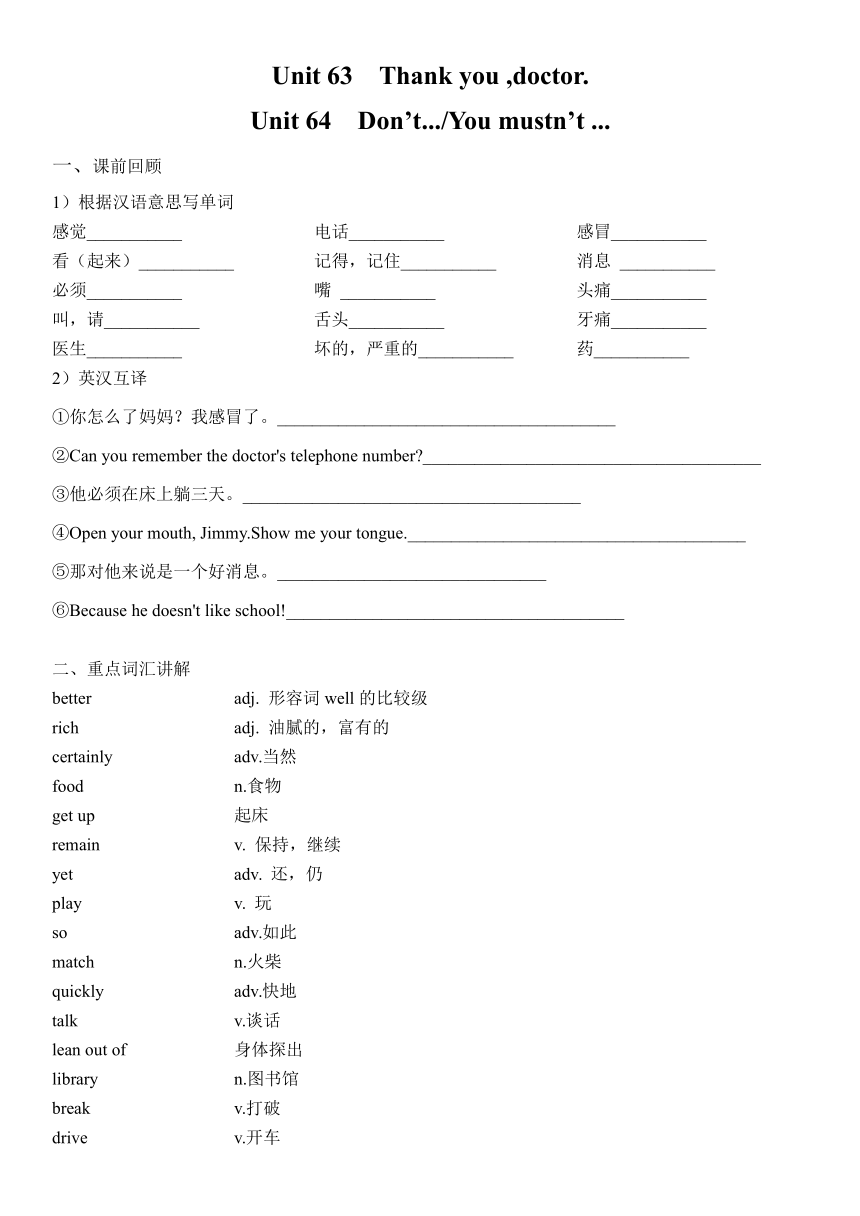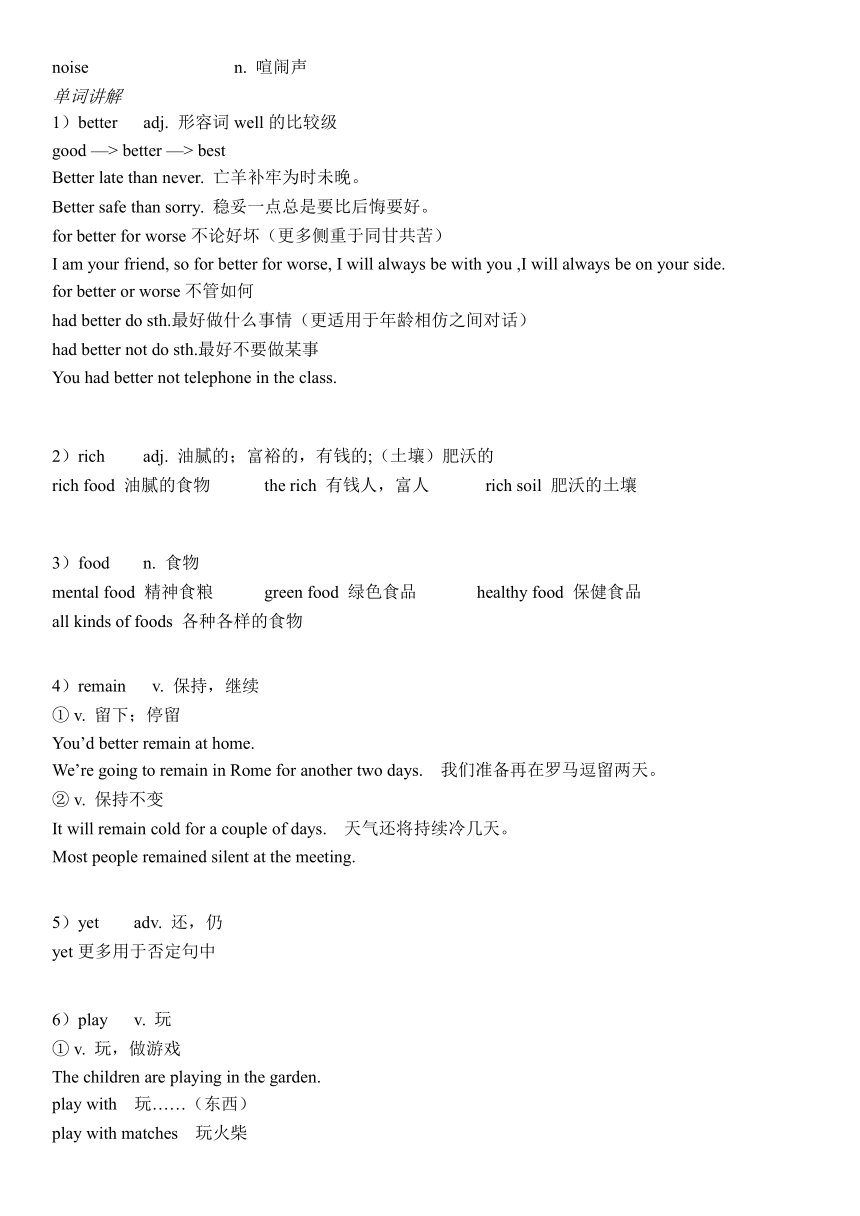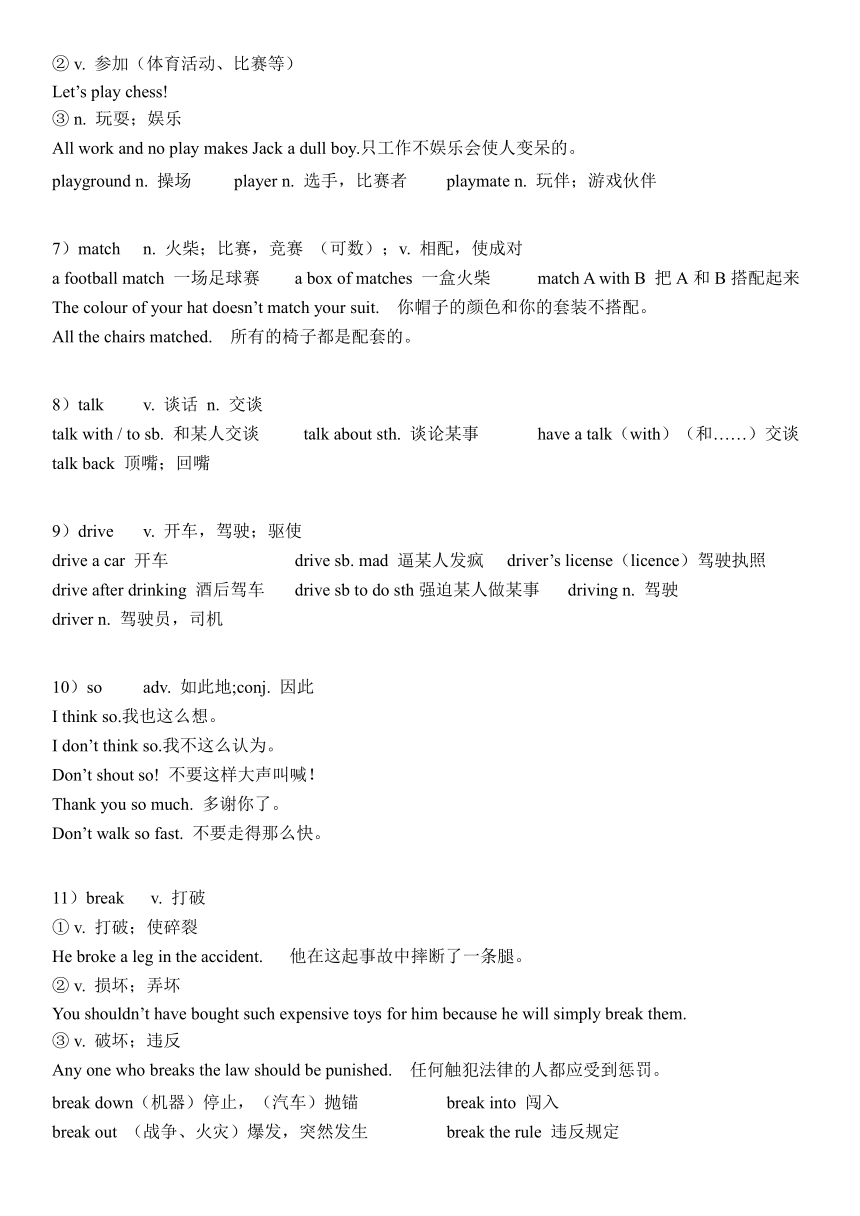新概念英语第一册 Lesson63-64讲义
文档属性
| 名称 | 新概念英语第一册 Lesson63-64讲义 |  | |
| 格式 | docx | ||
| 文件大小 | 26.7KB | ||
| 资源类型 | 教案 | ||
| 版本资源 | 新概念英语 | ||
| 科目 | 英语 | ||
| 更新时间 | 2024-04-28 10:40:43 | ||
图片预览



文档简介
Unit 63 Thank you ,doctor.
Unit 64 Don’t.../You mustn’t ...
课前回顾
1)根据汉语意思写单词
感觉___________
看(起来)___________
必须___________
叫,请___________
医生___________
电话___________
记得,记住___________
嘴 ___________
舌头___________
坏的,严重的___________
感冒___________
消息 ___________
头痛___________
牙痛___________
药___________
2)英汉互译
①你怎么了妈妈?我感冒了。_______________________________________
②Can you remember the doctor's telephone number _______________________________________
③他必须在床上躺三天。_______________________________________
④Open your mouth, Jimmy.Show me your tongue._______________________________________
⑤那对他来说是一个好消息。_______________________________
⑥Because he doesn't like school!_______________________________________
二、重点词汇讲解
better adj. 形容词well的比较级
rich adj. 油腻的,富有的
certainly adv.当然
food n.食物
get up 起床
remain v. 保持,继续
yet adv. 还,仍
play v. 玩
so adv.如此
match n.火柴
quickly adv.快地
talk v.谈话
lean out of 身体探出
library n.图书馆
break v.打破
drive v.开车
noise n. 喧闹声
单词讲解
1)better adj. 形容词well的比较级
good —> better —> best
Better late than never. 亡羊补牢为时未晚。
Better safe than sorry. 稳妥一点总是要比后悔要好。
for better for worse不论好坏(更多侧重于同甘共苦)
I am your friend, so for better for worse, I will always be with you ,I will always be on your side.
for better or worse不管如何
had better do sth.最好做什么事情(更适用于年龄相仿之间对话)
had better not do sth.最好不要做某事
You had better not telephone in the class.
2)rich adj. 油腻的;富裕的,有钱的;(土壤)肥沃的
rich food 油腻的食物 the rich 有钱人,富人 rich soil 肥沃的土壤
3)food n. 食物
mental food 精神食粮 green food 绿色食品 healthy food 保健食品
all kinds of foods 各种各样的食物
4)remain v. 保持,继续
① v. 留下;停留
You’d better remain at home.
We’re going to remain in Rome for another two days. 我们准备再在罗马逗留两天。
② v. 保持不变
It will remain cold for a couple of days. 天气还将持续冷几天。
Most people remained silent at the meeting.
5)yet adv. 还,仍
yet更多用于否定句中
6)play v. 玩
① v. 玩,做游戏
The children are playing in the garden.
play with 玩……(东西)
play with matches 玩火柴
② v. 参加(体育活动、比赛等)
Let’s play chess!
③ n. 玩耍;娱乐
All work and no play makes Jack a dull boy.只工作不娱乐会使人变呆的。
playground n. 操场 player n. 选手,比赛者 playmate n. 玩伴;游戏伙伴
7)match n. 火柴;比赛,竞赛 (可数);v. 相配,使成对
a football match 一场足球赛 a box of matches 一盒火柴 match A with B 把A和B搭配起来
The colour of your hat doesn’t match your suit. 你帽子的颜色和你的套装不搭配。
All the chairs matched. 所有的椅子都是配套的。
8)talk v. 谈话 n. 交谈
talk with / to sb. 和某人交谈 talk about sth. 谈论某事 have a talk(with)(和……)交谈
talk back 顶嘴;回嘴
9)drive v. 开车,驾驶;驱使
drive a car 开车 drive sb. mad 逼某人发疯 driver’s license(licence)驾驶执照
drive after drinking 酒后驾车 drive sb to do sth强迫某人做某事 driving n. 驾驶
driver n. 驾驶员,司机
10)so adv. 如此地;conj. 因此
I think so.我也这么想。
I don’t think so.我不这么认为。
Don’t shout so! 不要这样大声叫喊!
Thank you so much. 多谢你了。
Don’t walk so fast. 不要走得那么快。
11)break v. 打破
① v. 打破;使碎裂
He broke a leg in the accident. 他在这起事故中摔断了一条腿。
② v. 损坏;弄坏
You shouldn’t have bought such expensive toys for him because he will simply break them.
③ v. 破坏;违反
Any one who breaks the law should be punished. 任何触犯法律的人都应受到惩罚。
break down(机器)停止,(汽车)抛锚 break into 闯入
break out (战争、火灾)爆发,突然发生 break the rule 违反规定
have a break 休息一下
12)noise n. 喧闹声
make a noise中的noise是抽象名词。抽象名词是不可数的,前面加不定冠词a并不意味1、2、3等数目,只是赋予那个名词具体的含义,如一次、一种、一例、一番等。
have a rest 休息一下 take a look at… 看一眼……
noisy adj. 吵闹的 noisily adv. 吵闹地
13)重点短语
1.wake up醒来
2.get up起床
3.hurry up 快点
4.stand up 起立
5.look up查阅(书/字典)
6.rich food油腻的食物
7.the old老人
8.the young 年轻人
9.the rich富人
10.the poor穷人
11.keep healthy 保持健康
12.keep the room warm保持房间温暖
13.play the piano 弹钢琴
14.play the violin 拉小提琴
15.play the guitar 弹吉他
16.play football 踢足球
17.play games 玩游戏
18.play chess下棋
19.play with my friends 和朋友玩
20.play with matches 玩火柴
21.talk with +人 和某人谈话/聊天
22.talk to +人和某人谈话
23.talk about +人/事 谈论某人/某事
12.drive to work = go to work by car开车去上班
24.walk to work = go to work on foot 步行去上班
25.break the vase 打碎花瓶
26.break down 车抛锚/出故障
27.have a break 休息一下
三、课文及讲解
DOCTOR: How's Jimmy today
MRS. WILLIAMAS: Better. Thank you, Doctor.
DOCTOR: Can I see him please, Mrs. Williams
MRS. WILLIAMAS: Certainly , e upstairs.
DOCTOR: You look very well, Jimmy.
You are better now, but you mustn’t get up yet .
You must stay in bed for another two days.
DOCTOR: The boy mustn't go to school yet, Mrs. Williams.
And he mustn't eat rich food.
MRS. WILLIAMAS: Does he have a temperature, doctor
DOCTOR: No, he doesn't.
MRS. WILLIAMAS: Must he stay in bed
DOCTOR: Yes. He must remain in bed for another two days.
He can get up for about two hours ,but you must keep the room warm.
DOCTOR: Where's Mr. Williams this evening
MRS. WILLIAMAS: He's in bed, doctor. Can you see him please He has a bad cold, too!
课文讲解
How's Jimmy today Better. Thank you, Doctor.Can I see him please, Mrs. Williams Certainly , e upstairs.
①How…… 是一个比较常用的表示“如何”的疑问句。
a. 询问健康或一般生活情况,例如:
How are you 你好吗?How are you doing 近来好吗?
b. 询问“目前状况”,例如:How’s life 过的怎么样? How’s your work 工作怎么样?
②Better。是个省略句,完整句型为:He’s better.
better 是形容词well的比较级形式。well用作形容词表示“身体好的”。
此处用比较级是与之前Jimmy的身体状况进行比较。意为“健康状况有所好转”。
③Can I ……please 这是一个用can 来提问的表示请求的疑问句,意为“我可以……吗?”此句可改写为:Could I ……please 语气较为委婉。
④certainly是个副词,表示“当然”,其同义表达为:of course / sure;如用否定表达,则为:certainly not / of course not“当然不可以”。
⑤upstairs 是个合成副词,up(向上)+ stairs(楼梯),用来修饰动词come。其反义词为 go downstairs“下楼”
2)You look very well, Jimmy.You are better now, but you mustn’t get up yet . You must stay in bed for another two days.The boy mustn't go to school yet, Mrs. Williams.And he mustn't eat rich food.
①well 是形容词,表示“身体好的”,well作形容词只有词一个意思。其余用法均为副词。
②look是连系动词,后接形容词well构成系表结构。副词very修饰形容词well。
③情态动词must表示“必须”,否定词mustn’t,表示禁止,意为“一定不可以”。
④副词yet意为“还,仍”,一般用于否定句的句尾。
3)Does he have a temperature, doctor No, he doesn't.Must he stay in bed Yes. He must remain in bed for another two days.He can get up for about two hours ,but you must keep the room warm.
①have a temperature发烧
②another two days 意为“再有两天”。同义表达有以下几种方式:two other days / two more days / two days more;another 指(三者及其以上之中的)另一个,后接可数名词单数形式。但在此处表示“再,又”,后接复数形式的名词,表示“再来几个”。
③remain 连系动词,意为“保持,不变”,与stay或keep同义。
You must remain silent at the meeting. 在会上你要保持沉默。(remain silent 系表结构)
remain还可作实义动词,意为“留下,停留”。
You’d better remain at home. 你最好留在家里。
④each和 every 的别
each可单独使用,但every不可单独使用;
each可作代词或形容词,every只能做形容词
each可与of连用,但every不行;
each着重个别,every着重全体;
each用于两者及其以上中的每一个人或物,而every用于三者及其以上中的每一个人或物。
Each of the students has his own desk. 每个学生都有自己的书桌。(代词,与of 连用)
Each country has its own customs. 每个国家都有它的风俗。(形容词)
They receive one dollar each. 他们每人都拿到一美元。(副词,着重个别)
There are trees on each side of the road. 路的每一边都有树。(两者)
Each one of my parents has a car. 我的父母每人有一部车。(着重个别)
Every man wants to be teacher here. 人人都想成为老师。(着重全体)
⑤keep sb./sth. + adj. 使某人或某物保持某种状态。
We should keep our school clean. 我们应该保持我们学校干净。
4)Where's Mr. Williams this evening He's in bed, doctor. Can you see him please He has a bad cold, too!
①in bed躺在床上
② have a bad cold重感冒
四、重要语法
表示禁止的词don’t和mustn’t
don’t 与 mustn’t 都可以表示禁令。其区别如下:
①mustn't语气比较强烈,意为“一定不可以”,而don’t意为“不要,别”。
②don't表示禁止别人做某事时一般用在祈使句的句首,构成否定祈使句。而mustn’t是情态动词,必须放在主语的后面,实义动词的前面。
Don’t smoke in public. 不要在公共场合抽烟。
You mustn’t smoke in public. 你绝对不能在公共场合抽烟。
Don’t take this medicine. 不要吃这个药。
You mustn’t take this medicine. 你绝对不许吃这个药。
Don’t lean out of the window. 别把头或身子探出窗外。
You mustn’t lean out of the window. 你不许把头或身子探出窗外。
Unit 64 Don’t.../You mustn’t ...
课前回顾
1)根据汉语意思写单词
感觉___________
看(起来)___________
必须___________
叫,请___________
医生___________
电话___________
记得,记住___________
嘴 ___________
舌头___________
坏的,严重的___________
感冒___________
消息 ___________
头痛___________
牙痛___________
药___________
2)英汉互译
①你怎么了妈妈?我感冒了。_______________________________________
②Can you remember the doctor's telephone number _______________________________________
③他必须在床上躺三天。_______________________________________
④Open your mouth, Jimmy.Show me your tongue._______________________________________
⑤那对他来说是一个好消息。_______________________________
⑥Because he doesn't like school!_______________________________________
二、重点词汇讲解
better adj. 形容词well的比较级
rich adj. 油腻的,富有的
certainly adv.当然
food n.食物
get up 起床
remain v. 保持,继续
yet adv. 还,仍
play v. 玩
so adv.如此
match n.火柴
quickly adv.快地
talk v.谈话
lean out of 身体探出
library n.图书馆
break v.打破
drive v.开车
noise n. 喧闹声
单词讲解
1)better adj. 形容词well的比较级
good —> better —> best
Better late than never. 亡羊补牢为时未晚。
Better safe than sorry. 稳妥一点总是要比后悔要好。
for better for worse不论好坏(更多侧重于同甘共苦)
I am your friend, so for better for worse, I will always be with you ,I will always be on your side.
for better or worse不管如何
had better do sth.最好做什么事情(更适用于年龄相仿之间对话)
had better not do sth.最好不要做某事
You had better not telephone in the class.
2)rich adj. 油腻的;富裕的,有钱的;(土壤)肥沃的
rich food 油腻的食物 the rich 有钱人,富人 rich soil 肥沃的土壤
3)food n. 食物
mental food 精神食粮 green food 绿色食品 healthy food 保健食品
all kinds of foods 各种各样的食物
4)remain v. 保持,继续
① v. 留下;停留
You’d better remain at home.
We’re going to remain in Rome for another two days. 我们准备再在罗马逗留两天。
② v. 保持不变
It will remain cold for a couple of days. 天气还将持续冷几天。
Most people remained silent at the meeting.
5)yet adv. 还,仍
yet更多用于否定句中
6)play v. 玩
① v. 玩,做游戏
The children are playing in the garden.
play with 玩……(东西)
play with matches 玩火柴
② v. 参加(体育活动、比赛等)
Let’s play chess!
③ n. 玩耍;娱乐
All work and no play makes Jack a dull boy.只工作不娱乐会使人变呆的。
playground n. 操场 player n. 选手,比赛者 playmate n. 玩伴;游戏伙伴
7)match n. 火柴;比赛,竞赛 (可数);v. 相配,使成对
a football match 一场足球赛 a box of matches 一盒火柴 match A with B 把A和B搭配起来
The colour of your hat doesn’t match your suit. 你帽子的颜色和你的套装不搭配。
All the chairs matched. 所有的椅子都是配套的。
8)talk v. 谈话 n. 交谈
talk with / to sb. 和某人交谈 talk about sth. 谈论某事 have a talk(with)(和……)交谈
talk back 顶嘴;回嘴
9)drive v. 开车,驾驶;驱使
drive a car 开车 drive sb. mad 逼某人发疯 driver’s license(licence)驾驶执照
drive after drinking 酒后驾车 drive sb to do sth强迫某人做某事 driving n. 驾驶
driver n. 驾驶员,司机
10)so adv. 如此地;conj. 因此
I think so.我也这么想。
I don’t think so.我不这么认为。
Don’t shout so! 不要这样大声叫喊!
Thank you so much. 多谢你了。
Don’t walk so fast. 不要走得那么快。
11)break v. 打破
① v. 打破;使碎裂
He broke a leg in the accident. 他在这起事故中摔断了一条腿。
② v. 损坏;弄坏
You shouldn’t have bought such expensive toys for him because he will simply break them.
③ v. 破坏;违反
Any one who breaks the law should be punished. 任何触犯法律的人都应受到惩罚。
break down(机器)停止,(汽车)抛锚 break into 闯入
break out (战争、火灾)爆发,突然发生 break the rule 违反规定
have a break 休息一下
12)noise n. 喧闹声
make a noise中的noise是抽象名词。抽象名词是不可数的,前面加不定冠词a并不意味1、2、3等数目,只是赋予那个名词具体的含义,如一次、一种、一例、一番等。
have a rest 休息一下 take a look at… 看一眼……
noisy adj. 吵闹的 noisily adv. 吵闹地
13)重点短语
1.wake up醒来
2.get up起床
3.hurry up 快点
4.stand up 起立
5.look up查阅(书/字典)
6.rich food油腻的食物
7.the old老人
8.the young 年轻人
9.the rich富人
10.the poor穷人
11.keep healthy 保持健康
12.keep the room warm保持房间温暖
13.play the piano 弹钢琴
14.play the violin 拉小提琴
15.play the guitar 弹吉他
16.play football 踢足球
17.play games 玩游戏
18.play chess下棋
19.play with my friends 和朋友玩
20.play with matches 玩火柴
21.talk with +人 和某人谈话/聊天
22.talk to +人和某人谈话
23.talk about +人/事 谈论某人/某事
12.drive to work = go to work by car开车去上班
24.walk to work = go to work on foot 步行去上班
25.break the vase 打碎花瓶
26.break down 车抛锚/出故障
27.have a break 休息一下
三、课文及讲解
DOCTOR: How's Jimmy today
MRS. WILLIAMAS: Better. Thank you, Doctor.
DOCTOR: Can I see him please, Mrs. Williams
MRS. WILLIAMAS: Certainly , e upstairs.
DOCTOR: You look very well, Jimmy.
You are better now, but you mustn’t get up yet .
You must stay in bed for another two days.
DOCTOR: The boy mustn't go to school yet, Mrs. Williams.
And he mustn't eat rich food.
MRS. WILLIAMAS: Does he have a temperature, doctor
DOCTOR: No, he doesn't.
MRS. WILLIAMAS: Must he stay in bed
DOCTOR: Yes. He must remain in bed for another two days.
He can get up for about two hours ,but you must keep the room warm.
DOCTOR: Where's Mr. Williams this evening
MRS. WILLIAMAS: He's in bed, doctor. Can you see him please He has a bad cold, too!
课文讲解
How's Jimmy today Better. Thank you, Doctor.Can I see him please, Mrs. Williams Certainly , e upstairs.
①How…… 是一个比较常用的表示“如何”的疑问句。
a. 询问健康或一般生活情况,例如:
How are you 你好吗?How are you doing 近来好吗?
b. 询问“目前状况”,例如:How’s life 过的怎么样? How’s your work 工作怎么样?
②Better。是个省略句,完整句型为:He’s better.
better 是形容词well的比较级形式。well用作形容词表示“身体好的”。
此处用比较级是与之前Jimmy的身体状况进行比较。意为“健康状况有所好转”。
③Can I ……please 这是一个用can 来提问的表示请求的疑问句,意为“我可以……吗?”此句可改写为:Could I ……please 语气较为委婉。
④certainly是个副词,表示“当然”,其同义表达为:of course / sure;如用否定表达,则为:certainly not / of course not“当然不可以”。
⑤upstairs 是个合成副词,up(向上)+ stairs(楼梯),用来修饰动词come。其反义词为 go downstairs“下楼”
2)You look very well, Jimmy.You are better now, but you mustn’t get up yet . You must stay in bed for another two days.The boy mustn't go to school yet, Mrs. Williams.And he mustn't eat rich food.
①well 是形容词,表示“身体好的”,well作形容词只有词一个意思。其余用法均为副词。
②look是连系动词,后接形容词well构成系表结构。副词very修饰形容词well。
③情态动词must表示“必须”,否定词mustn’t,表示禁止,意为“一定不可以”。
④副词yet意为“还,仍”,一般用于否定句的句尾。
3)Does he have a temperature, doctor No, he doesn't.Must he stay in bed Yes. He must remain in bed for another two days.He can get up for about two hours ,but you must keep the room warm.
①have a temperature发烧
②another two days 意为“再有两天”。同义表达有以下几种方式:two other days / two more days / two days more;another 指(三者及其以上之中的)另一个,后接可数名词单数形式。但在此处表示“再,又”,后接复数形式的名词,表示“再来几个”。
③remain 连系动词,意为“保持,不变”,与stay或keep同义。
You must remain silent at the meeting. 在会上你要保持沉默。(remain silent 系表结构)
remain还可作实义动词,意为“留下,停留”。
You’d better remain at home. 你最好留在家里。
④each和 every 的别
each可单独使用,但every不可单独使用;
each可作代词或形容词,every只能做形容词
each可与of连用,但every不行;
each着重个别,every着重全体;
each用于两者及其以上中的每一个人或物,而every用于三者及其以上中的每一个人或物。
Each of the students has his own desk. 每个学生都有自己的书桌。(代词,与of 连用)
Each country has its own customs. 每个国家都有它的风俗。(形容词)
They receive one dollar each. 他们每人都拿到一美元。(副词,着重个别)
There are trees on each side of the road. 路的每一边都有树。(两者)
Each one of my parents has a car. 我的父母每人有一部车。(着重个别)
Every man wants to be teacher here. 人人都想成为老师。(着重全体)
⑤keep sb./sth. + adj. 使某人或某物保持某种状态。
We should keep our school clean. 我们应该保持我们学校干净。
4)Where's Mr. Williams this evening He's in bed, doctor. Can you see him please He has a bad cold, too!
①in bed躺在床上
② have a bad cold重感冒
四、重要语法
表示禁止的词don’t和mustn’t
don’t 与 mustn’t 都可以表示禁令。其区别如下:
①mustn't语气比较强烈,意为“一定不可以”,而don’t意为“不要,别”。
②don't表示禁止别人做某事时一般用在祈使句的句首,构成否定祈使句。而mustn’t是情态动词,必须放在主语的后面,实义动词的前面。
Don’t smoke in public. 不要在公共场合抽烟。
You mustn’t smoke in public. 你绝对不能在公共场合抽烟。
Don’t take this medicine. 不要吃这个药。
You mustn’t take this medicine. 你绝对不许吃这个药。
Don’t lean out of the window. 别把头或身子探出窗外。
You mustn’t lean out of the window. 你不许把头或身子探出窗外。
同课章节目录
